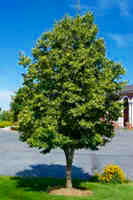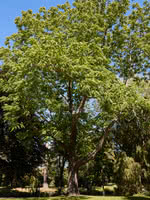Mon-Fri 9am - 5pm Mountain time
Little Leaf Linden vs Black Walnut
Tilia cordata
Juglans nigra
NOT AVAILABLE THIS SEASON - MIGHT RETURN
NOT AVAILABLE THIS SEASON - MIGHT RETURN
Little Leaf Linden is a large, deciduous shade tree that is native to Europe. The leaves are heart shaped with fine teeth on the margins. It has much smaller leaves than Large Leaf Linden.
Its small, fragrant yellow-green flowers are said to have medicinal properties and can also be used to make honey. Little leaf Linden is a great choice for a boulevard or large lot.
The Black Walnut is a slow growing, large, straight-stemmed tree with an open crown. It produces dense, very hard, edible nuts.
Black Walnut has a deeply-furrowed, black bark. Its leaves are about 1 foot long, composed of 15 - 23 slightly stalked leaflets on a moderately stout stock which provide good dappled shade.
Despite being highly valued for its edible nuts and its shade tree aesthetics, it is rare to see this tree on the prairies.
Note: Black Walnut's roots produce a substance named juglone that is toxic to some other plants. Consider this when choosing where you plant a black walnut, as you will not be able to grow tomato, potato, cabbage, eggplant, blueberry, azalea, rhododendron, lilac, red pine and apple in the surrounding area.
Note: Plant this tree once. It will not respond well to transplanting.
Note: Although self-pollinating, planting two trees significantly improves nut production.

